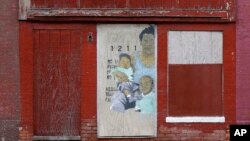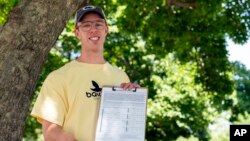New parents in Baltimore could receive a $1,000 “baby bonus” if voters approve a proposal that aims to help reduce childhood poverty from birth with a modest one-time cash payment.
A group of Baltimore teachers is behind the effort. Organizers recently secured the necessary 10,000 signatures to bring the question to voters as a ballot initiative in November. Their campaign relied on extensive canvassing efforts and a cute logo: a flying cartoon stork with a bag of money in its beak.
The proposal is loosely modeled on a program implemented this year in Flint, Michigan, where women receive $1,500 during mid-pregnancy and $500 per month for the first year after giving birth. Officials said the Flint program was the first of its kind in the U.S.
Countries in Europe and Asia have experimented with larger cash payments, but those programs are meant to encourage more people to have more kids, not address child poverty. Italy, which has one of the world’s lowest birth rates, provides baby bonus checks and other benefits aimed at increasing the population.
Organizers behind the Baltimore campaign say more systemic change is needed on a national level to help lift families out of poverty, but giving new parents a modest financial boost could prove an important first step.
“If we’re going to spend a limited amount of money, where do you get the most bang for your buck? Research says at birth,” said Nate Golden, a high school math teacher who helped found the Maryland Child Alliance, which is pushing for the ballot initiative. “This could literally have a lifelong impact on a kid.”
Golden said he also hopes the program will demonstrate to elected leaders in Baltimore and beyond that there’s a real appetite among voters for implementing policies that help vulnerable children succeed.
The issue is particularly urgent in Baltimore, where an estimated 31% of school-aged children are experiencing poverty, according to census data. Nationally, childhood poverty fell during the pandemic thanks to federal relief programs, but it has since climbed again to about 12% in 2022.
It’s incredibly hard for the poor to move up the economic ladder, especially among communities of color. Research shows that most American children born into the lowest income bracket will remain at roughly the same socioeconomic status for the rest of their lives.
Golden said he sees similar scenarios playing out in his classroom every school year — with students who are experiencing homelessness, food insecurity, gun violence and countless other challenges.
“When you see what they’re going through outside school, I’m still going to demand their best in the classroom but it’s just not enough,” he said. “We have to take care of these underlying needs before we can get kids to focus on learning.”
If the ballot initiative is approved, all new parents in Baltimore will receive a one-time payment of at least $1,000.
An estimated 7,000 children are born in Baltimore each year, so the program would cost about $7 million annually, which is roughly 0.16% of the city’s annual operating budget, according to supporters. The initiative won’t result in higher taxes, but it will be up to Baltimore’s City Council to allocate funds if it passes.
Advocates say taking a blanket approach to distributing the funds ensures that no one falls through the cracks. It also means some of the money goes to affluent parents who don’t need assistance, but Golden said it’s worth including them to avoid leaving out the poorest families.
Considering the payments are relatively small, the universal approach makes sense because researching and developing a qualification system could add significant costs and delay implementing the program, said Christina DePasquale, associate professor of economics at the Johns Hopkins Carey Business School.
Above all, DePasquale said, the initiative will raise awareness about childhood poverty
and could lead to more comprehensive changes down the road.
“It’s worthwhile in the sense that it gets people thinking about it,” she said. “It’s something to build off of. Even if you don’t have something perfect, the less perfect version of it is better than not having it at all.”
While no one contends that $1,000 is a life-changing amount of money, it could help cover some of the many costs that come with having a baby, including paying for diapers, formula, strollers, cribs and more. And for new parents living on society’s margins, that could make a real difference, said Nadya Dutchin, executive director of the Baltimore-based organization ShareBaby, which distributes free diapers and other baby essentials.
“I don’t think people really pay enough attention to the material insecurities that contribute to parental stress,” she said. “If you don’t have enough money to purchase diapers to keep your child dry, safe and healthy, you’re going to be stressed and your baby is going to be stressed.”
She said requests for supplies increased a huge amount last year amid rising inflation and stagnant wages.
The largest federal program aimed at addressing childhood poverty is the child tax credit, which was temporarily expanded during the pandemic. Although shown to be effective, advocates say it leaves out some families because of necessary paperwork and qualification requirements.









